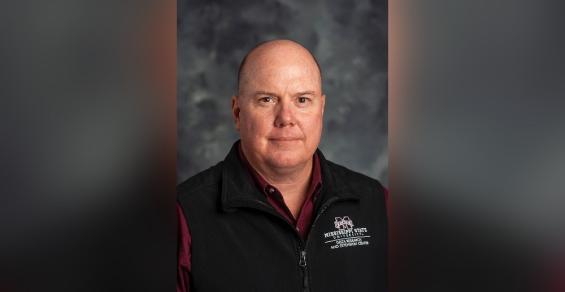Long-time entomologist Jeff Gore officially assumed the role on Nov. 1.
Jeff Gore, a long-time Mississippi State University entomologist and researcher has been named head of the MSU Delta Research and Extension Center.
Gore assumed the role on Nov. 1. He has served as interim center head since Nov. 16, 2021. He has been based at the Stoneville station as an entomologist with the MSU Extension Service and a researcher with the Mississippi Agricultural and Forestry Experiment Station since 2007.
“Dr. Gore’s years of experience, along with his relationships with producers, stakeholder groups and MSU faculty and staff, make him uniquely equipped to serve in this role,” said Experiment Station Director Scott Willard. “I am excited to welcome him as center head full time.”
The center focuses its research and Extension educational activities on cotton, rice, soybean, corn, and catfish production. Its primary goal is to increase yields of the region’s producers while preserving and protecting the Delta’s environment and natural resources.
The 4,700-acre center has a network of laboratories, offices, greenhouses, research facilities, and engineering and maintenance shops, as well as a comprehensive library. It employs more than 20 research scientists and more than 100 support personnel.
It is one of four regional centers in the state and serves as the hub of operations for 19 Extension offices in northwest Mississippi.
“I have no doubt Dr. Gore will do an outstanding job,” said Steve Martin, interim Extension director. “As an accomplished and respected Extension and research professor, he understands the important relationship between Extension education and research activities.”
In his own words
The day of the announcement, Gore was the featured guest on MSU’s Crop Doctors’ Podcast. The full recording can be found on the MSU Extension website, but below are highlights from the conversation.
On outlook for new role
“I don’t know if I’ll ever love anything as much as being an entomologist, but it was time to take on a new challenge,” Gore said.
“One of the things I’ve enjoyed throughout my career is mentoring graduate students. Seeing growth in students has been a major motivating factor through my career. In the new role, I look forward to being able to mentor young faculty. Hopefully, I can serve them as a guide or positive influence.”
On leadership style
“Leaders I have admired are those who gave me what I needed to be successful and then left me alone. That’s the kind of leader I strive to be, too,” he said. “I want to break down barriers for faculty or help them figure out how to get around barriers, give them the support that they need and help minimize the number of distractions.”
On ag research challenges
“In today’s world, having unified voices between university, growers and USDA will be extremely important moving forward as growers strive to remain profitable, and keep producing crops the way they have,” Gore said.
“One change I’ve seen in more than 25 years of agricultural research is the interaction of science and policy. Policy used to be influenced by science. But I’m seeing more and more that science is being influenced by policy.”
“You see that in proposals for grants that come out. They’re extremely focused on cover crops and climate change. And those are all important things, but they tend to be long-term problems. We’re not seeing a lot of students come out who are working on short-term problems. They are both important. And as scientists we need to be addressing both the long-term problems and the immediate needs of our producers and stakeholders.”
On future
“We have about 80 buildings and structures (tractor sheds, shops, etc.) on DREC. More than half were built before the mid-20th century,” Gore said. “Maintaining and improving infrastructure is a priority. This center has been here since 1904. Nothing lasts that long without being relevant. DREC Stoneville has been relevant for a long time, and we’ll have to continue that.”




